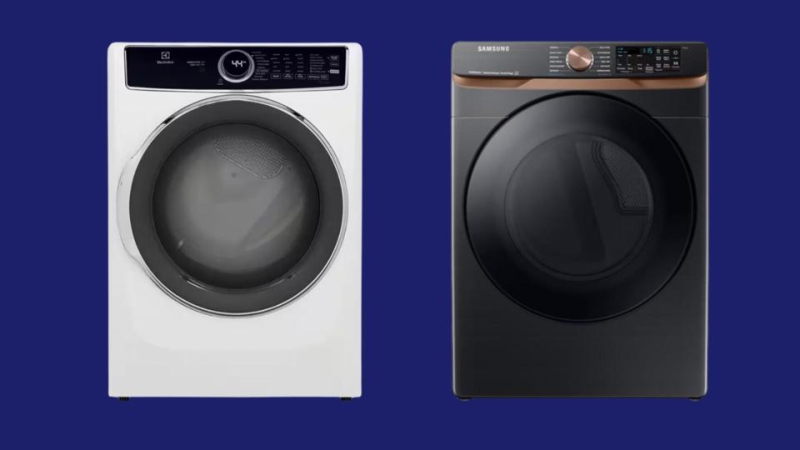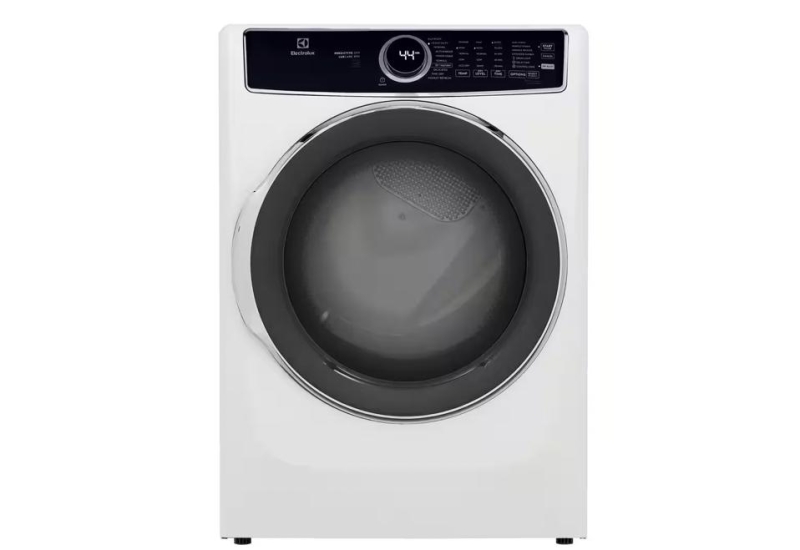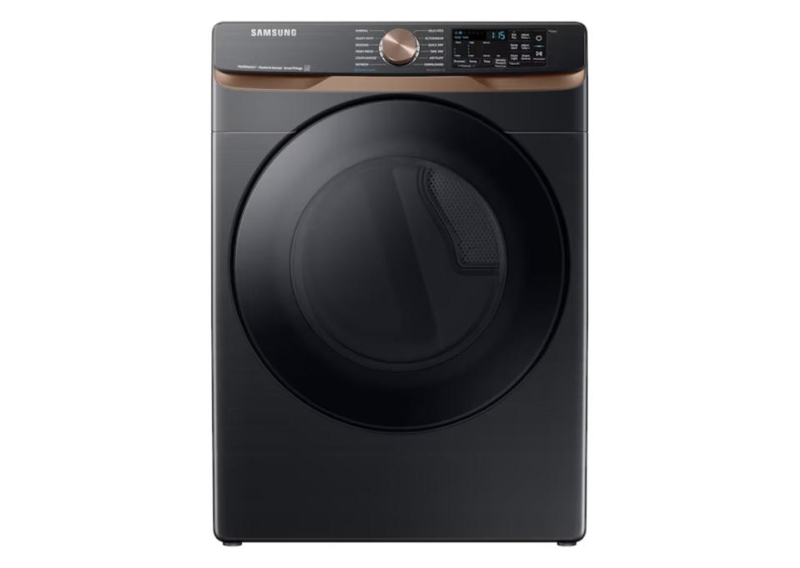
Many shoppers are intimidated when it comes to choosing gas vs. electric dryers. Luckily, with expert guidance, it’s possible to sort through the specs and find the one that’s right for your needs.
As you narrow your search, be sure to move beyond the basics and explore the features of different models, such as drying cycles, capacity and energy efficiency—all of which we’ve highlighted in our guide, ahead. To simplify the process, we’ve not only broken down the main differences between gas and electric dryers, but have also included specific recommendations for a few of our favorite 2024 models.
Gas Vs Electric Dryers: An Overview
Gas and electric dryers may look the same at a glance, but they’ve got a critical, fundamental difference: They use different power sources and mechanisms to dry your clothes, and that source can impact everything from installation and operating costs to drying times. “A gas dryer uses natural gas or propane to heat air, which is then blown through the clothes to dry them quickly,” explains Shlomo Cherniak, owner of Cherniak Home Services, a handyman service in Baltimore, Md. “It’s efficient and effective for drying clothes fast.” Gas dryers also tend to work faster at drying your clothes than electric dryers, he points out.
Electric dryers use heat from an electric heating element to warm your clothes, explains Aaron Wilson, an appliance technician and appliance expert for JustAnswer. “Then, it pushes the moisture in the air out through a dryer duct, [which goes] outside the house or building,” he says. While electric dryers are more popular these days, Cherniak points out that they can take 15 to 20 minutes longer than their gas counterparts to dry a full load. And that’s far from the only difference between the two machine types.
Gas Vs Electric Dryers: Price Differences
Another big difference between gas and electric dryers: the price. You’re going to need to examine both upfront costs and longterm savings in order to have a real understanding of the expense at hand. Typically, electric dryers are less expensive upfront, while gas dryers tend to have a higher initial cost due to more complicated installation requirements. But gas dryers can potentially be more cost-effective over time (natural gas is usually cheaper than electricity). Still, your initial budget matters here: In terms of the actual cost of the machine, gas dryers are also slightly more expensive. For companies that offer dryers in gas and electric versions, the sticker price is usually about $100 higher in gas models.
“Electric dryers are less expensive initially and require less complex installation,” Cherniak says. For most, this means plugging in the machine and hooking it to a dryer vent; some might desire more expensive custom installations to fit the device seamlessly into their laundry rooms. However, electric dryers will naturally cost you more in electricity bills. Depending on gas prices in your area, gas dryers may be cheaper to run per cycle than their electric counterparts.
Finally, there’s the matter of service. If you do run into a performance issue, you might end up paying more with a gas dryer; these must be serviced by a licensed professional for maximum safety. Electric dryers, by comparison, are considered somewhat easier for homeowners to fix on their own, although you might also need to have yours professionally serviced if things really go haywire.
Gas Vs Electric Dryers: Installation Methods
This is a big consideration for homeowners considering a gas vs. electric dryer—perhaps the biggest. “Installing a gas dryer requires a gas line and proper venting, which can be complex and costly,” Cherniak says. And if you don’t currently have a gas hookup, it will need to be installed in your laundry area—no matter what’s going on in the rest of your home. “Even if there is a gas line in another part of the house, if there isn’t one in the laundry room, one will have to be run,” adds Ryan Carrigan, CEO and founder of moving company MoveBuddha. “This process can be costly.”
Gas dryers also require a dryer vent to the outside to prevent moisture from building up in your home, and they should be installed by a professional to make sure there are no gas leaks. “Installation costs for gas dryers can exceed $200, not including the gas line installation,” Cherniak says. (Worth noting: Some manufacturers offer installation packages that can help you save money with the actual installation.)
Electric dryers, meanwhile, typically require access to a 240-volt outlet, which is different from standard 120-volt electrical outlet. “These outlets are available in two configurations: Three-prong for older homes and four-prong for newer homes, with the latter providing extra safety,” says Aldo Ceja, home expert with Thumbtack. If your home doesn’t currently have a 240-volt outlet where you plan to put your dryer, you’ll need to contact an electrician to install one. But if there’s already a 240-volt outlet in place, setting up your electric dryer is as simple as plugging it in and connecting it to a dryer vent. “If you’re open to a fun DIY project, installing an electric dryer is definitely doable,” says Angie Hicks, home expert and co-founder of Angi.
Gas Vs Electric Dryers: Maintenance And Upkeep
As with several of the other differing aspects we’ve listed here, the maintenance of gas and electric dryers differ primarily due to their power sources. Gas dryers require regular, thorough checks of the gas lines; gas leaks are a serious issue. Electric dryers have simpler maintenance needs, but you might need to check the thermostat and replace any damaged cords or plugs to prevent electrical risks. And in general, “both types of dryers require regular lint trap and vent cleaning to prevent fire hazards,” Cherniak says.
Gas Vs Electric Dryers: Safety Considerations
Safety is an absolutely critical factor when it comes to deciding between gas and electric dryers. While it might not be the ultimate dealbreaker, it must be considered in order for consumers to make an informed, safe purchase. “Electric dryers are generally considered safer because they don’t involve combustion, eliminating risks like gas leaks or carbon monoxide emissions,” Cherniak says. “Gas dryers require a carbon monoxide detector nearby as an additional safety measure.”
Because both types of dryers plug in, they do come with a risk of electrical fire. That risk is technically low if you follow the right precautions, like making sure your wiring is in good condition, regularly cleaning your dryer and emptying the lint filter regularly, per the U.S. Fire Administration.
Still, both types of dryers are generally considered safe when they’re properly installed and maintained. If you’re leaning toward a gas dryer but are concerned about safety, consult a professional at installation time and for all routine checks, install smoke and carbon monoxide detectors near your laundry area and generally stay alert. For both types of dryers, be diligent about cleaning the lint filter and checking the vent system—and remind everyone in your household to do the same.
Final Verdict
There’s a long list of pros and cons when it comes to gas and electric dryers, and the best option ultimately depends on your specific needs and circumstances—there is, in fact, no “better” option here. Keep your budget in mind, as well as installation capabilities, energy costs in your area and personal preferences for maintenance and safety risks. And ahead, find two of the top models in 2024.
Our Top Gas Dryer Pick In 2024
A Roomy Electrolux Model With Ample Features For Busy Families

Electrolux Front Load Perfect Steam Gas Dryer
What you’ll love:
- Generous capacity
- Shorter, 15-minute cycle available
- “Instant Refresh” option for items like jeans
Keep in mind:
- Stacking kit sold separately
This gas model from Electrolux offers an impressive 8 cubic feet of capacity, making it an ideal option for larger families. It’s equipped with eight distinct drying cycles and offers advanced “humidity-sensing” technology to ensure that your clothes are dried efficiently and safely (a nice perk given all of the inherent safety risks with gas dryers). For those moments when you’re pressed for time, the 15-minute fast dry option is a great solution; additionally, the “Instant Refresh” cycle is a good choice for jeans and other items that need some love but aren’t ready for a full wash. This dryer can be stacked with its corresponding washer to save space, though it’s important to note that a stacking kit, sold separately, is required.
Our Top Electric Dryer Pick In 2024
A Sleek Choice With A Whopping 10 Cycles And Wi-Fi Capabilities

Samsung Smart Electric Dryer
Type: Front load | Size: 27 x 38.7 x 31.4 inches | 7.5 cubic feet | Drying cycles: 12 | Energy Star certified: Yes
What You’ll Love:
- Large capacity
- Energy Star certified
- Sleek, stackable design
Keep In Mind:
- Some users have trouble pairing with the app
A generous 7.5 cubic feet of space is just one of the many reasons we named this the best electric dryer of 2024. It also features a relatively affordable price tag, sensor drying technology (which minimizes the risk of ending up with damp clothes) and a variety of finishes. One of the standout features is its Wi-Fi capability, allowing you to sync the dryer with an app on your phone; this means you can monitor and control your laundry from virtually anywhere. The dryer can also be stacked to help you save valuable floor space. A high capacity combined with smart features and a legitimately beautiful design make this an excellent choice.
Why Trust Forbes Vetted
Forbes Vetted’s home and kitchen team is helmed by experts in the field who monitor the market, looking at new releases, reviewing products and conducting firsthand testing. We’ve published hundreds of stories on home appliances, included expert-driven roundups of the best washer and dryer sets, electric dryers and washing machines.
- Forbes Vetted’s home and kitchen team is led by three seasoned editors: deputy editor Rebekah Lowin, senior editor Amanda Arnold and editor Sholeen Damarwala.
- The writer of this piece, Korin Miller, is a regular contributor with years of hands-on experience reviewing and testing home appliances.
- To enhance our knowledge of the dryer space, we consulted with five experts: Shlomo Cherniak, owner of Cherniak Home Services, a handyman service in Baltimore, Md.; Aaron Wilson, an appliance technician and appliance expert for JustAnswer; Ryan Carrigan, CEO and founder of moving company MoveBuddha; Angie Hicks, home expert and co-founder of Angi and Aldo Ceja, home expert with Thumbtack.


